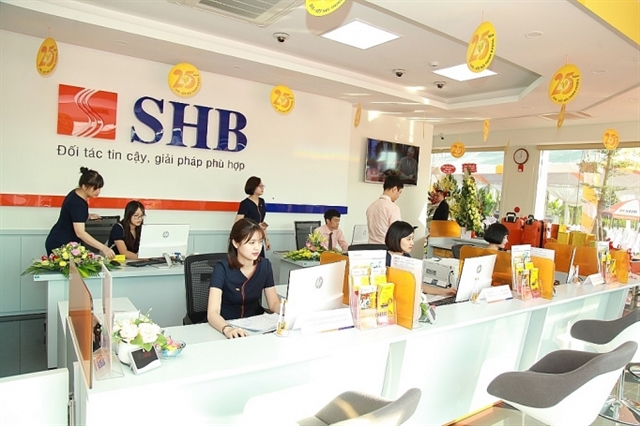SHB shareholders have not been paid any cash dividend since 2014, when the bank decided to pay a 7.5 per cent cash dividend to shareholders.

Sai Gon-Ha Noi Joint Stock Commercial Bank (SHB) is among the banks that have seen their shares trade below the average value of VND10,000.
SHB shares (HNX: SHB) slumped 4.2 per cent to end Monday at VND6,800 per share.
SHB shares have been below par for most of the time since its debut in April, 2009.
The factors drawing investors into one company’s stock are the consistency of dividend payments and business performance.
SHB shareholders have not been paid any cash dividend since 2014, when the bank decided to pay a 7.5 per cent cash dividend to shareholders.
Since then, the bank has issued bonus shares to pay dividends despite improved results year after year.
At its annual shareholder meeting last April, the bank was questioned when it would pay cash dividends, and again the bank declined.
The merger with Habubank in 2012 had increased SHB’s total non-performing loans or bad debts, so the bank had had to increase the risk provision, the bank’s management board said at the meeting.
The bank had also sold a number of bad debts to the Vietnam Asset Management Co (VAMC) for VAMC bonds that were expected to mature after eight years.
Under the central bank’s regulation, a financial institution that has VAMC bonds with more than a five-year term is unable to pay cash dividends.
On the last days of 2019, local media reported the State Bank of Vietnam had granted permission for SHB to issue bonus shares as 2017 and 2018 dividends at the rate of 20.9 per cent.
The bank plans to issue more than 251.4 million bonus shares to pay dividends for 2017 and 2018. The issuance will help increase the bank’s charter capital to VND14.55 trillion from VND12.03 trillion so that the bank can meet Basel II standards in the first quarter of 2020.
As local banks and financial firms are on the way to meet Basel II standards, SHB may not re-start paying cash dividend soon.
“SHB needs to put capital increase as a top-priority so the bank’s development is sustainable and up-to-date,” the bank said in the 2019 annual shareholder meeting resolution.
The quality of assets is also another reason that has concerned investors when they look at SHB shares.
In 2019, SHB reported a pre-tax profit of more than VND3 trillion, up 47-166 per cent from the figures made in 2016-18.
But risk provision soared 66 per cent year-on-year to almost VND2.37 trillion. Half of the full-year risk provision was made in the fourth quarter of 2019.
The bank’s total asset was up 13 per cent compared to the previous year to VND365.6 trillion with liabilities increasing by 60 per cent to VND12.77 trillion.
Of the liabilities, potential non-collectible debts were nearly VND3.5 trillion. The figure fell 11 per cent year-on-year.
SHB is among the six commercial banks with the highest amount and percentage of bad debts. In 2019, bad debt ratio at SHB dropped to 1.83 per cent from 2.39 per cent.
Other banks whose share prices are also below VND10,000 per share are LienVietPostBank (UPCoM: LPB) and the National Citizen Commercial Joint Stock Bank (HNX: NVB). – VNS





